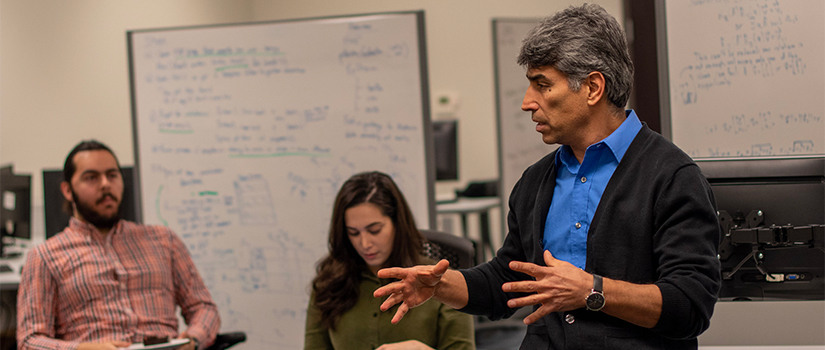Undergraduate Programs
Each undergraduate program includes optional concentrations in Artificial Intelligence and Cybersecurity.
Computer scientists design and build software applications.
This program covers the techniques, algorithms and theory necessary for building software, includes sub-specialties such as artificial intelligence, video games, bioinformatics, computer forensics, networks, web applications, enterprise computing, scientific computing, databases and others.
Typical job titles for new graduates: software engineer, software developer, systems analyst, database manager
Computer engineers build and program embedded systems.
The computer engineering degree is for students interested in both programming and hardware. The required classes cover software engineering, computer science and electric and digital circuit designs. The degree provides students with a deep knowledge of how computers work. Plus you'll learn to develop computing hardware or software that communicates directly with the hardware, such as VLSI, embedded systems, device drivers, real-time operating systems, robotics and others.
Typical job titles for new graduates: computer engineer, software engineer
Computer information systems experts design and implement information technology solutions for businesses.
This program provides a core grounding in programming classes, computer networks and cyber security, alongside a minor in Business Information Management. The degree covers how information systems are used in today's business and what it takes to implement and manage these information systems.
Typical job titles for new graduates: system administrator, business information manager, network administrator, software developer.
Undergraduate Minors
All disciplines can benefit from computing technology. The various tracks of this multidisciplinary minor are designed to provide the knowledge of modern computing technology you need to be more effective in your major area of interest, such as management of electronic medical records for nurses or the ability to create attractive websites and for journalists and creative writers.
The Minor in Data Science is jointly offered by the Department of Statistics and the Department of Computer Science and Engineering. It is designed for students in any discipline that uses large data sets, including the sciences, engineering, business, mathematics and the social sciences.
This minor will make you a competent software developer. You will be able to write small programs, web pages, spreadsheet macros, and understand the internet and the web at a deeper level. A solid background in programming is valued in many careers. Almost all professional jobs require the manipulation and analysis of data, which requires the ability to understand and program computers.
Graduate Programs
In the 12-credit hour Artificial Intelligence Graduate Certificate program, you’ll gain a basic understanding of AI systems and be challenged to develop and deploy AI systems that solve problems in a variety of fields. Students in the program may select an area of concentration, including knowledge representation and reasoning, computer vision, natural language processing, reasoning under uncertainty, or machine learning. The vast areas of application make the AI Certificate a valuable addition to any course of graduate study.
More about the Graduate Certificate in Artificial Intelligence
Doctor of Philosophy in Computer Engineering
The Ph.D. in Computer Engineering emphasizes research on computer architecture, embedded device and system design and development and other computing systems. Applications include robotics, communications and Internet of Things.
More about graduate programs in Computer Engineering
Master of Science in Computer Engineering
The Master of Science in Computer Engineering is designed to provide a strong foundation for careers in the computing and information systems industries. This degree provides in-depth knowledge on the core topics of computer systems and device design, along with additional studies in the subfield of your choice.
Students may select a thesis or non-thesis option.
Doctor of Philosophy in Computer Science
The PhD in Computer Science emphasizes research on computational theory, data structures, algorithms and statistical models. Applications include artificial intelligence, machine learning, cyber security and big data.
More about graduate programs in Computer Science
Master of Science in Computer Science
The Master of Science degree in Computer Science is intended for students that seek both breadth and depth in advanced computing topics. This degree provides in-depth knowledge on the core topics of computer software, compilers and algorithms, along with additional courses and a thesis in your chosen area of study.
Students may select to conduct research and write a thesis or pursue a non-thesis option.
This 12-credit hour graduate certificate covers cyber security concepts, models and technologies, cyber security risk management and cyber defense strategies. Students improve their ability to design cyber security capabilities to meet organizational needs within realistic constraints such as economic, environmental, social, political and ethical expectations.
Special Learning Opportunity
Undergraduate and graduate students can receive documentation of completion that meets the requirements for the National Training Standard for Information Systems Security (INFOSEC) Professionals. This program is evaluated under that IA Coursework Evaluation Program of the National Security Agency and the Committee on National Security Systems.
